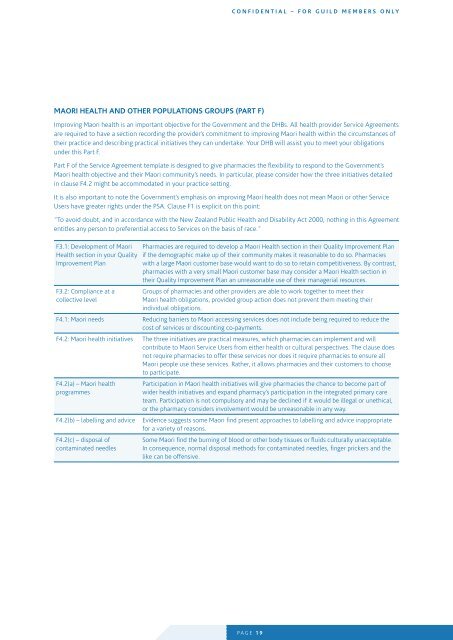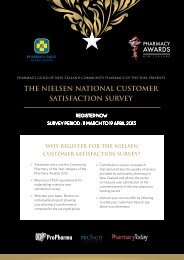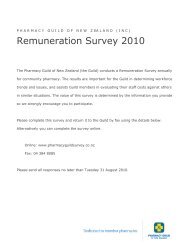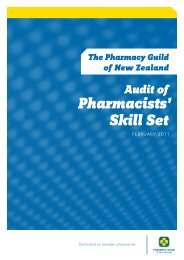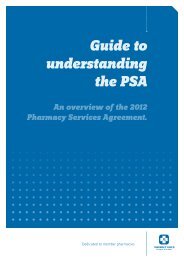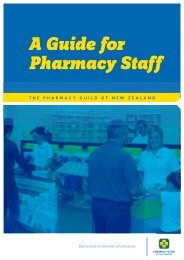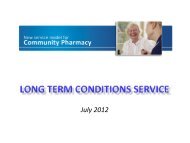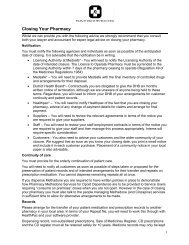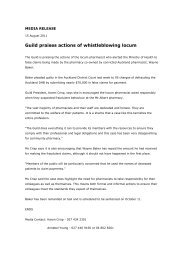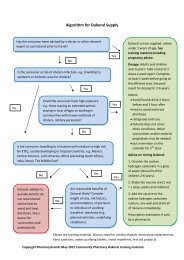Pharmacy Services Agreement 2010 Guide for Guild members
Pharmacy Services Agreement 2010 Guide for Guild members
Pharmacy Services Agreement 2010 Guide for Guild members
- No tags were found...
Create successful ePaper yourself
Turn your PDF publications into a flip-book with our unique Google optimized e-Paper software.
confidential – <strong>for</strong> – <strong>for</strong> guild guild <strong>members</strong> only onlyMaori health and other populations groups (Part F)Improving Maori health is an important objective <strong>for</strong> the Government and the DHBs. All health provider Service <strong>Agreement</strong>sare required to have a section recording the provider’s commitment to improving Maori health within the circumstances oftheir practice and describing practical initiatives they can undertake. Your DHB will assist you to meet your obligationsunder this Part F.Part F of the Service <strong>Agreement</strong> template is designed to give pharmacies the flexibility to respond to the Government’sMaori health objective and their Maori community’s needs. In particular, please consider how the three initiatives detailedin clause F4.2 might be accommodated in your practice setting.It is also important to note the Government’s emphasis on improving Maori health does not mean Maori or other ServiceUsers have greater rights under the PSA. Clause F1 is explicit on this point:“To avoid doubt, and in accordance with the New Zealand Public Health and Disability Act 2000, nothing in this <strong>Agreement</strong>entitles any person to preferential access to <strong>Services</strong> on the basis of race.”F3.1: Development of MaoriHealth section in your QualityImprovement PlanF3.2: Compliance at acollective levelF4.1: Maori needsF4.2: Maori health initiativesF4.2(a) – Maori healthprogrammesF4.2(b) – labelling and adviceF4.2(c) – disposal ofcontaminated needlesPharmacies are required to develop a Maori Health section in their Quality Improvement Planif the demographic make up of their community makes it reasonable to do so. Pharmacieswith a large Maori customer base would want to do so to retain competitiveness. By contrast,pharmacies with a very small Maori customer base may consider a Maori Health section intheir Quality Improvement Plan an unreasonable use of their managerial resources.Groups of pharmacies and other providers are able to work together to meet theirMaori health obligations, provided group action does not prevent them meeting theirindividual obligations.Reducing barriers to Maori accessing services does not include being required to reduce thecost of services or discounting co-payments.The three initiatives are practical measures, which pharmacies can implement and willcontribute to Maori Service Users from either health or cultural perspectives. The clause doesnot require pharmacies to offer these services nor does it require pharmacies to ensure allMaori people use these services. Rather, it allows pharmacies and their customers to chooseto participate.Participation in Maori health initiatives will give pharmacies the chance to become part ofwider health initiatives and expand pharmacy’s participation in the integrated primary careteam. Participation is not compulsory and may be declined if it would be illegal or unethical,or the pharmacy considers involvement would be unreasonable in any way.Evidence suggests some Maori find present approaches to labelling and advice inappropriate<strong>for</strong> a variety of reasons.Some Maori find the burning of blood or other body tissues or fluids culturally unacceptable.In consequence, normal disposal methods <strong>for</strong> contaminated needles, finger prickers and thelike can be offensive.PAGE 19


